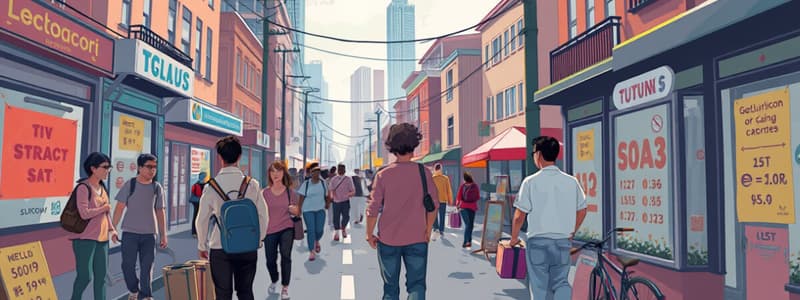Podcast
Questions and Answers
What do most Americans consider themselves to be?
What do most Americans consider themselves to be?
- Lower Class
- Working Class
- Middle Class (correct)
- Upper Class
What does social mobility in the American class system look like?
What does social mobility in the American class system look like?
Small moves within the middle range of classes.
When did the American middle class begin to emerge?
When did the American middle class begin to emerge?
Late 18th century.
What significant economic change occurred in the 1960s?
What significant economic change occurred in the 1960s?
The post-industrial society is characterized by the prevalence of finished goods.
The post-industrial society is characterized by the prevalence of finished goods.
Which of the following represents the upper middle class?
Which of the following represents the upper middle class?
Who comprises the lower middle class?
Who comprises the lower middle class?
What are the three tiers of the working class?
What are the three tiers of the working class?
What caused the decline in middle class jobs starting in the mid-1970s?
What caused the decline in middle class jobs starting in the mid-1970s?
What was a significant contributing factor to the shrinking of the middle class during the Great Recession?
What was a significant contributing factor to the shrinking of the middle class during the Great Recession?
What does economic restructuring refer to?
What does economic restructuring refer to?
What is meant by the term 'middle class squeeze'?
What is meant by the term 'middle class squeeze'?
Study Notes
Middle Class Society
- America is often viewed as a middle-class society, but this conception is both objective and subjective.
- Many Americans identify as "middle class" despite the absence of clear definitions of class.
Social Mobility
- Social mobility within the American class system often involves small movements within the middle range of classes.
Historical Development of the Middle Class
- The American middle class emerged with industrial capitalism from the late 18th century through the 1920s.
- The late 18th century saw entrepreneurs embodying American individualism and free enterprise.
- A shift from farm labor to factory work occurred as industrialization progressed.
- By the 1920s, white-collar workers emerged within bureaucratic structures.
Shifts in the Middle Class (1960s-1970s)
- The 1960s marked a transition from a manufacturing-based to a service-based economy, indicating a post-industrial society.
- Expansion of the middle classes followed World War II, but a decline began after the mid-1970s.
Post-Industrial Society
- Post-industrial society focuses on services and information rather than finished products, leading to a decline in blue-collar workers.
Upper Middle Class
- Comprised mostly of white-collar workers engaged in mental labor, they tend to be more politically active.
- This class has two main subgroups: professionals and managers.
Lower Middle Class
- Characterized by its diversity, largely consists of small business owners and white-collar workers.
- Members rely on their income and often lack significant wealth.
Working Class
- Defined primarily by blue-collar workers with limited education, it includes skilled tradespeople, those with mechanical skills, and unskilled workers.
- This class exhibits its own unique subculture, including early marriages and a patriarchal family structure.
Shrinking Middle Class
- Beginning in the mid-1970s, socioeconomic changes initiated a middle-class squeeze characterized by stagnant income levels.
- Most middle-class households now depend on dual incomes rather than single-income earners.
Causes of Job Decline in the Middle Class
- Jobs in the middle are decreasing primarily in the service sector and among blue-collar workers due to:
- Downsizing
- Mechanization
- Globalization
- The Great Recession and economic restructuring further exacerbated the situation.
The Great Recession
- Initiated in 2007, it had a profound impact on the middle classes, resulting in severe unemployment rates.
Economic Restructuring
- A significant contributor to the shrinking middle class involved a shift from a manufacturing economy to a service-based one.
- Influential factors include:
- Technological advances (computers, robotics)
- Global economic dynamics (international trade, outsourcing)
- Decline of labor unions amid increased education and competition
- Downsizing initiatives for corporate efficiency
- Demographic changes involving immigration and women's participation in the workforce
- New government policies supporting increased corporate power and a regressive tax system.
The Middle Class Squeeze
- The middle class is bifurcating, creating two distinct groups: those who are successful and those who are increasingly falling behind.
Studying That Suits You
Use AI to generate personalized quizzes and flashcards to suit your learning preferences.
Description
Test your knowledge of the concepts from Chapter 5 about the middle classes in American society. This quiz includes key terms and definitions that explore social class perception and its complexities. Enhance your understanding of the diverse groups that make up the middle class.




